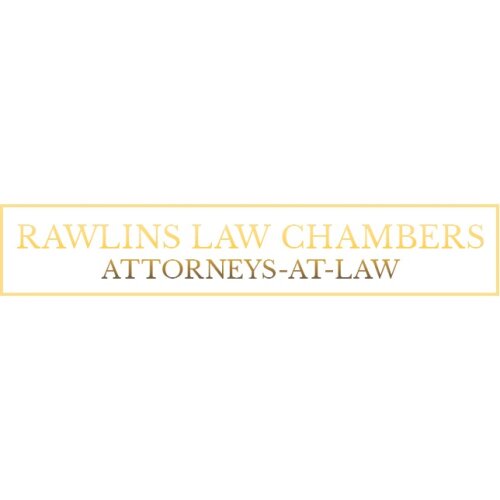Best Faith-Based Law Lawyers in Barbados
Share your needs with us, get contacted by law firms.
Free. Takes 2 min.
Or refine your search by selecting a city:
List of the best lawyers in Barbados
About Faith-Based Law in Barbados
Faith-Based Law in Barbados encompasses legal principles and regulations that intersect with religious beliefs and practices. The island nation is home to a diverse array of religious communities, including Christianity, Hinduism, Islam, and others. Faith-Based Law addresses legal issues that arise within these communities, such as the administration of religious institutions, marriage ceremonies, inheritance matters, and other religiously-influenced legal concerns. In Barbados, where religion plays a significant role in cultural and social life, having a clear understanding of Faith-Based Law is essential for the responsible practice and protection of religious freedoms.
Why You May Need a Lawyer
Consulting a lawyer specializing in Faith-Based Law can be crucial in several situations, including:
1. **Marriage and Divorce**: These often involve religious elements like specific rites and rules that are recognized within the community but may require legal validation.
2. **Religious Institution Governance**: Disputes or misunderstandings regarding the management or operation of religious organizations can necessitate legal guidance.
3. **Inheritance and Estate Planning**: Faith-Based Law issues can arise in situations where a person desires their estate to be distributed according to specific religious protocols.
4. **Employment within Religious Institutions**: Employment law can be complex when it involves faith-based organizations; a lawyer can help ensure compliance with both civil and religious laws.
5. **Religious Discrimination**: Legal advice may be needed if someone believes they are a victim of discrimination based on their religious beliefs.
Local Laws Overview
Barbados has a legal system influenced by both its colonial history and international treaties, which includes aspects of Faith-Based Law. Key aspects include:
1. **Freedom of Religion**: Enshrined in the Barbados Constitution, this ensures the right to practice one's religion freely, provided it does not infringe on public interest or others' rights.
2. **Marriage Act**: This law governs marriage ceremonies, including those performed by religious officials recognized by the state, ensuring they comply with civil legal standards.
3. **Employment Rights Act**: While this protects against discrimination in employment, specific provisions may apply to faith-based organizations, particularly regarding roles that are core to religious practice.
4. **Charitable Organizations Act**: Many religious institutions operate as charities, which must comply with regulations regarding registration, reporting, and governance.
Frequently Asked Questions
1. What is Faith-Based Law?
Faith-Based Law refers to the intersection of legal issues and religious beliefs, practices, and governance.
2. Are religious marriages legally recognized in Barbados?
Yes, as long as they are performed by a recognized religious official and adhere to the Marriage Act of Barbados.
3. Can religious beliefs influence child custody decisions?
While religious beliefs might be considered, the child's best interest is the primary concern in custody decisions.
4. Can I allocate my estate according to religious principles?
Yes, but it's crucial to ensure that any will or estate plan complies with Barbados’ legal standards to be enforceable.
5. What should I do if I face religious discrimination?
You should document incidents and seek legal advice to understand your rights and possible courses of action.
6. Do religious institutions need to register as charities?
Yes, if they seek to obtain tax-exempt status and comply with the governance provisions outlined by the Charitable Organizations Act.
7. Can public schools require religious instruction?
Religious instruction in schools is generally voluntary, respecting the freedom of religion and parental preferences.
8. Are all faith practices protected under Barbados law?
Yes, as long as they do not infringe on order, morality, health, or others' rights, all religious practices are protected.
9. How does the Employment Rights Act affect religious organizations?
Religious organizations must adhere to employment laws, but there can be exceptions for roles significant to religious functions.
10. How can religion influence contract law in Barbados?
Contracts involving religion must still satisfy legal principles of fairness and good faith to be enforceable.
Additional Resources
1. **Ministry of Ecclesiastical Affairs**: Provides guidance on issues related to religious practices and institutional governance.
2. **Bar Association of Barbados**: Offers directories of attorneys, including those with expertise in Faith-Based Law.
3. **Registrar’s Department**: Oversees the registration of marriages, charities, and documents relevant to religious organizations.
4. **Legal Aid Barbados**: Provides assistance for those who qualify and need legal support, including Faith-Based Law matters.
Next Steps
If you need legal assistance in faith-based matters, consider the following steps:
1. **Identify the Issue**: Clearly understand and define the issue or concern that requires legal attention.
2. **Research Lawyers**: Identify lawyers who specialize in Faith-Based Law in Barbados through directories or recommendations.
3. **Consultation**: Contact a legal practitioner for an initial consultation to discuss your situation.
4. **Documentation**: Gather all relevant documents or evidence that may help your legal adviser understand your case.
5. **Engage Services**: If necessary, formally engage the lawyer’s services to ensure proper legal representation and support.
Lawzana helps you find the best lawyers and law firms in Barbados through a curated and pre-screened list of qualified legal professionals. Our platform offers rankings and detailed profiles of attorneys and law firms, allowing you to compare based on practice areas, including Faith-Based Law, experience, and client feedback.
Each profile includes a description of the firm's areas of practice, client reviews, team members and partners, year of establishment, spoken languages, office locations, contact information, social media presence, and any published articles or resources. Most firms on our platform speak English and are experienced in both local and international legal matters.
Get a quote from top-rated law firms in Barbados — quickly, securely, and without unnecessary hassle.
Disclaimer:
The information provided on this page is for general informational purposes only and does not constitute legal advice. While we strive to ensure the accuracy and relevance of the content, legal information may change over time, and interpretations of the law can vary. You should always consult with a qualified legal professional for advice specific to your situation.
We disclaim all liability for actions taken or not taken based on the content of this page. If you believe any information is incorrect or outdated, please contact us, and we will review and update it where appropriate.
Browse faith-based law law firms by city in Barbados
Refine your search by selecting a city.










